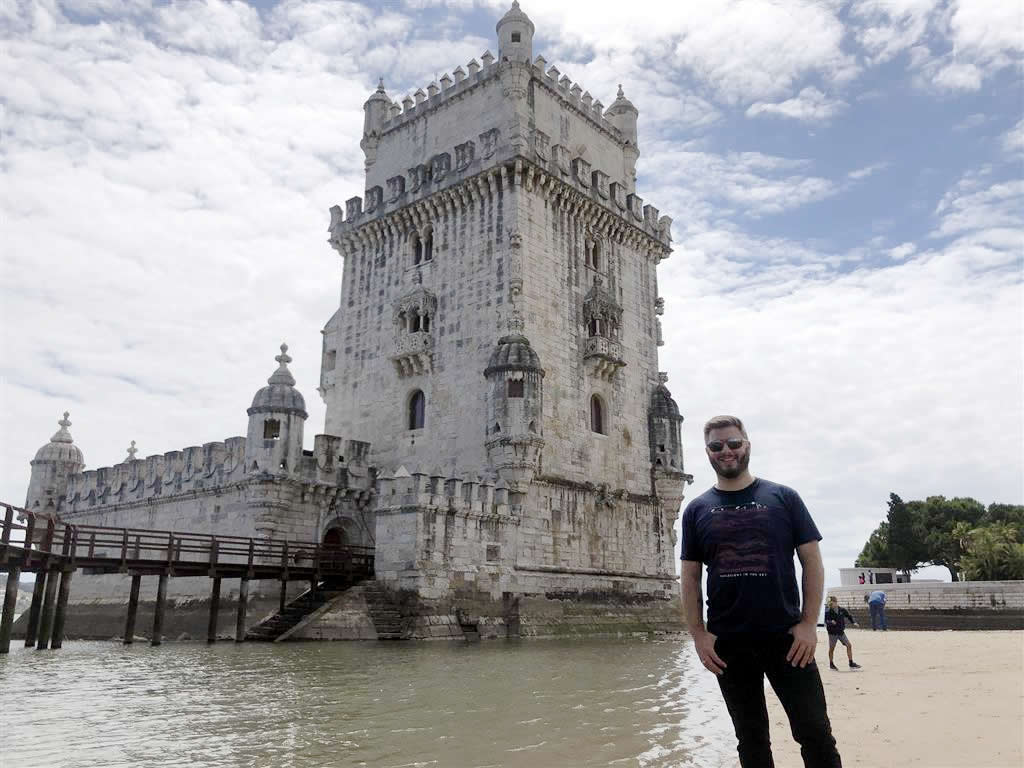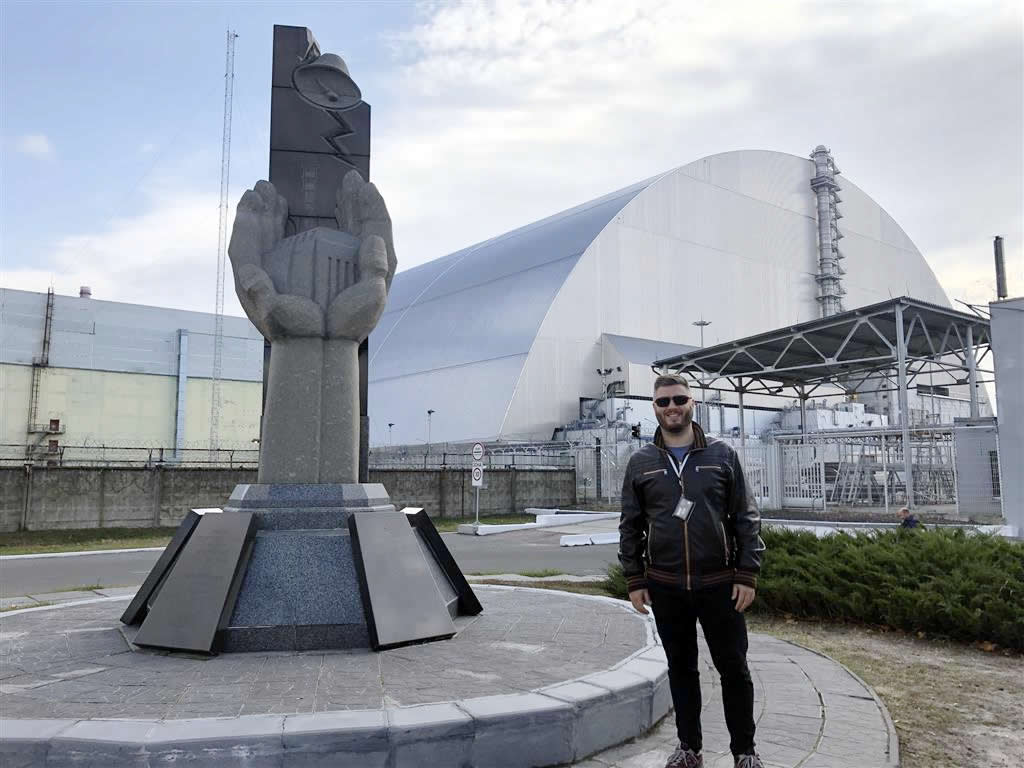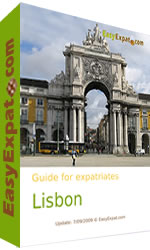From the US to Porto in Portugal: Expat Empire

My name is David McNeill and I'm originally from the United States. I moved abroad in 2014 and have lived in Japan, Germany, and now Porto, Portugal.
Why did you move abroad?
I moved abroad because it was something I had always dreamed about doing. I've had an interest in traveling and seeing the world since I was quite young. I'm not sure exactly why that is, but I think it was a mix of moving around the United States for my parents' jobs growing up, being fortunate enough to take a few international trips when I was young, and hearing exciting stories from my grandpa about seeing the world in the 1950s while on world tours in the US Navy.
I developed a passion for foreign countries, particularly Japan, when I was 12 years old. That's when I started studying the Japanese language after developing an interest in Japanese animation and games. I continued my studies through high school and then double-majored in finance and Japanese at the University of Texas, Austin. I had hoped to study abroad in Japan but couldn't manage it if I wanted to graduate on time, so I decided to spend a semester studying at the National University of Singapore instead. The few months I spent there showed me that I could successfully live in other countries around the world, not just in Japan, and it opened my eyes to new possibilities for living abroad in the future.
I still had dreams of working in Japan after graduation but wasn't able to find a job there straight away, so I started my career as an investment banking analyst in the United States. I soon discovered that finance was not the right career for me and felt a deep longing for adventure. I spent those days and nights in my cubicle daydreaming about traveling around the world. I even considered moving within the bank to international offices or changing banks to try to find a way to move abroad, but those dreams never came to fruition.
A few years later, I left the finance industry to become a software product manager at a San Francisco technology startup. It was at that job that I finally got my first chance to work abroad. I went with a team of product managers to their Beijing, China office for three months, and I asked them to send me back again and for longer the next time. I was finally seeing a way that I could live and work abroad, and so I was ready to do whatever I needed to in order to make it happen.
Unfortunately, I was laid off from the company one month after arriving back in the United States and so my plans for going back to China suddenly disappeared. However, I became determined that the layoff would not keep me from finding a way to work abroad again. I set off on a two-month trip around Europe and took Skype interviews for jobs in China and Japan while hopping from city to city. Long story short, at the end of my travels, I got an offer to work in Tokyo, so I went back to the US, got my visa, and moved to Japan in 2014.
Since then, I have spent two years in Tokyo, three years in Berlin, and now almost two years in Porto, Portugal. I have visited nearly 60 countries and hope to keep my international adventure going for as long as possible.

How have you been impacted by the Covid-19 crisis?
My wife and I moved to Portugal in November 2019, so thankfully we were already settled here when the crisis began in March 2020. I feel very fortunate that the timing worked out for us to be able to continue living here throughout the pandemic.
That said, we have had to deal with many issues since the crisis began. The first was getting my wife's Portuguese residence permit when her appointment at the immigration office was postponed from the end of March 2020 until May, but luckily it all worked out in the end. Another big change came in October 2020 when the company that I came to Portugal to work for laid me off along with many of my colleagues due to pandemic-related budget cuts. Thankfully, I had already been planning to work on my company Expat Empire full-time, so I was ready to jump into action once the news of the layoffs arrived.
What sort of measures are in place in the country where you live?
We have had two major prolonged lockdowns in Portugal, one starting in March 2020 and ending in the summer and then another from January 2021 until around May. Outside of those lockdown periods, we have had to deal with other changes including things like reduced working hours for stores and restaurants on the weekends and curfews at night.
In recent months, we've experienced a gradual rollback of the regulations so that daily life is mostly back to normal at this point. The final regulations will be rolled back over the next few months as more people get vaccinated. The vaccinations are happening very quickly now and the majority of the population has already received both doses. We still need to wear masks indoors and in crowded public spaces as well as to show vaccination certificates or negative tests to be able to eat indoors at restaurants during the weekends, but otherwise life feels like it's back to some kind of normal.
How do you make a living?
I moved to Portugal through the same software product management career that took me to Japan and Germany. Just as in the other countries, I found a local job that sponsored my work visa so my wife and I could move here.
At the start of the pandemic, we were told to work from home for two weeks at first. Unsurprisingly, we never went back to the office throughout the rest of the time that I worked for that company.
I was laid off from that job in October 2020 alongside several colleagues due to pandemic-related budget cuts, so I had to figure out what I wanted to do next with my career. I had already been working on my company Expat Empire for more than two years as a side project at that point and my goal was to transition to working on it full-time, so I used the layoff as an opportunity to start pursuing my dreams. It's great to be in a position to help people around the world to move abroad as retirees, employees, digital nomads, and more as we come out of this pandemic situation and people continue to reassess what they want to do with their lives going forward.
What is your personal opinion on the way the pandemic is currently managed by the country?
I think Portugal has taken the pandemic fairly seriously and has generally done the right things to deal with the situation. There are always areas that could be improved or changed when considering how the situation has been handled by every country across the globe, but I've personally been quite happy with how the government has dealt with it here.
The single thing I'm most thankful for is the fact that the Portuguese government and people have made us feel so welcome here over the last 18 months. Their hospitality has contributed to our desire to continue living in Portugal for the foreseeable future.
What custom/ habits do you find most strange about your adopted culture?
I don't really find it strange, but one thing I have been surprised by is the number of people who smoke in public places here. It's not uncommon for people to smoke even in places where it's not allowed or against the law, but often nobody does or says anything about it as those kinds of small infractions are usually not enforced.
Similarly, there is an unfortunate number of dog droppings left on the streets, which is also technically against the law, but because these laws are rarely enforced, people continue to do what they want. The lack of enforcement of these kinds of laws is one aspect of southern European living that gets on my nerves.
What is a myth about your adopted country?
I think one of the main narratives that is currently being told over and over again in the media about Portugal is how cheap it is to live here. While it's certainly not expensive compared to many cities around the world, it's also not very cheap when you factor in the increases in rent and general prices over the last decade as more foreigners like me have immigrated here. If you want to have a simple life in the interior of Portugal, it can definitely be cheap. However, if you want to live a comfortable life in the city center near the ocean in a nice apartment eating non-Portuguese food at times and occasionally traveling around the country and region, then your lifestyle definitely won't be as cheap as many of the articles claim. Your cost of living in Portugal will depend on many factors related to the kind of lifestyle you want to lead, but I would suggest that you don't go in with the expectation that it will be extremely cheap or you might get sticker shock.
Without thinking about the current pandemic, what's your favorite thing about being an expat in Portugal?
We moved to Porto for the warm weather, warm people, and great food. All three of those aspects have definitely impressed us over the last two years!
And what’s the worst thing about being an expat in Portugal?
Living in Portugal requires dealing with their slow and frustrating bureaucracy. Every legal or tax topic takes weeks or months to get sorted out and the fact that there is often nothing you can do to speed the process up quickly becomes irritating. Being used to things moving more quickly in a more structured way in the other countries I've lived in has made it difficult to adjust to this aspect of Portuguese expat life.
What do you miss most?
As someone who enjoys going to concerts, museums, and other cultural events, sometimes I miss the wealth of choice that I had for events while living in larger and more international cities like San Francisco, Tokyo, and Berlin. This is not to say that Portugal doesn't have some good museums and exciting events going on in normal times, but even if you compare the capital city of Lisbon with other large European metropolises, it won't win in terms of cultural events due to its smaller size and location on the western edge of Europe.
How do you manage the relationship with your family in your home-country?
We have calls more frequently with our family members now compared to pre-pandemic times. We have even started playing cooperative games over Zoom calls, which has helped to make us feel closer together despite the physical distance.
However, it has been harder to make friends locally compared to the countries I lived in before. As a result of these difficulties, I've become closer to my childhood friends living in the US who I keep in contact with over video calls and text chats.
Before the social distancing measures, what did you do to meet people in get familiar with you country?
We arrived just before the pandemic, so it has always been a challenge for us to meet people here. I actually started the Expat Empire meetup group in Porto in February 2020 as a way to meet more people in the area, and it has been running on a monthly basis throughout the non-quarantined periods since then. When I move to a new country, I typically meet people through meetup events, at concerts, and through my friends and coworkers.
What advice would you give other expats?
Portugal is an incredible country to call home, but it can also be an expensive place to live, especially when you take into account local salary levels. Therefore, if you intend to continue working after moving to Portugal, it's probably a good idea to build up a few income streams in your home country before moving that you can continue to manage remotely. The D7 visa enables you to use foreign income streams to qualify for residence in Portugal, so make use of that as well as the Non-Habitual Resident (NHR) tax status to live more comfortably in the country over the long run.
When and why did you start your company?
I founded Expat Empire in order to inspire people to move abroad and help them do it. It started in July 2018 with the release of my first book Passport to Working in Japan. Later that year, we released the first episodes of the Expat Empire Podcast where I talk to expats and digital nomads around the world about the hard parts of moving, living, and working abroad. Since then, we have also published blog posts, created online courses, and started meetup groups.
In addition to all this content, we also offer moving abroad consulting services to help our clients to make it happen. Whether you're looking to retire somewhere warm, start the next chapter of your international career, or become a digital nomad, we can help you take the next step in your journey. We currently offer free consulting calls to help you get clearer on your goals and how you can achieve them, so please contact us to schedule a time to chat!

 The Company details in the directory of services: Expat Empire
The Company details in the directory of services: Expat Empire

Find out more about being an expat in Portugal with our expat guide:
Expat guide for Portugal
To be considered for an interview, add your blog to BlogExpat.com
Editorial Team :)